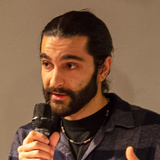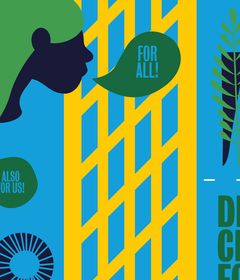In the new Designing Cities for All: RE-generation series In Common , DCFA Fellow Roberto Rocco (spatial planner and researcher at TU Delft) delves into the concept of ’the commons’ as a tool for re-generation from three dimensions: social, economic, and environmental. How can we learn to understand how they are intertwined and indissociable? And how do we use this knowledge to reshape our relationship with the planet, through bottom-up collective initiatives, joint responsibility, collective care, and action?
This first episode focuses on the social dimension. Conflict — whether interpersonal, or cultural, between political leadership and citizens, or between nations — causes grave injustices. But conflict can also be a bridge for communication and consensus building towards shared visions. Together with designers, researchers, citizen activists, and other experts, we explore ‘naked conflict’ as a possible pathway for change.





About the DCFA Fellow
Roberto Rocco is an Associate Professor of Spatial Planning and Strategy at the Department of Urbanism (TU Delft).He is a specialist in governance for the built environment.This includes issues of spatial justice and social sustainability as crucial dimensions of sustainability transitions.He also leads the discussion on diversity and inclusion at the faculty he works for and he is one of the people behind A Manifesto for the Just City .
Watch Roberto’s introduction of his DCFA Fellowship on ’the commons’ below!
About the speakers
Redouan Boussaid worked as the economic area manager of iconic Plein 40-45 in Amsterdam Nieuw-West together with the people from the market on the waste issue to improve the quality of life in the square. He was the initiator of Zero Waste Lab 40/45 to reduce waste from the market such as plastic, cardboard, and residual waste by separating and processing it better. In this role, he also worked closely with entrepreneurs and market vendors to tackle the waste problem. He will share with us the story of the conflicts in this project.
Unfortunately, Redouan cannot join the programme tonight.
Nanke Verloo is an assistant professor in Urban Politics and Planning at the University of Amsterdam.She specializes in conflict, citizen participation, and inclusion and exclusion in urban development processes.Trained in both Anthropology and Public Administration, she uses an interdisciplinary and ethnographic approach to explore how cities can be governed, lived, and experienced more inclusively.
Rumpelstiltskin is a member of Anarcha-Feminist Group Amsterdam , an anarchist intersectional squat group that fights against all forms of exploitation and oppression. She was a former member of Bond Precarious Housing (BPW) , an association that fights for the right to housing and the city. They do this by standing up for the housing rights of people who live temporarily, insecurely, or too expensively.
Max de Ploeg is a grassroots community organizer and member at De Nieuwe Meent , a housing cooperative in Amsterdam. He believes in taking care of our environment collectively and that further privatization and concentration of capital need strong alternative solutions.
About Designing Cities for All: RE generation
Over the past two years of Designing Cities for All (DCFA) we’ve learned about exclusion by design and the (re)-design of inclusive cities. Along the journey, a certain question kept popping up: what exactly does ‘for all’ entail? After focusing mostly on the ‘who’ over the past two years, DCFA is rebooting as Designing Cities for All: RE-generation . This time around, the series is also incorporating the ‘what’ by looking through the fresh lens of regenerative design . This emerging field might very well be a promising answer to the challenges of our time, as it focuses on the (re)-design of products, services, and ecological recovery that keep the systems healthy.


Today, “the commons” encompasses the world of seed saving, community-supported agriculture, peer production, fab-labs and hacker spaces, distributed manufacturing, co-production, open source, copyleft (as opposed to copyright), creative commons licenses, the collaborative and sharing economy, and the social and solidarity economy.

The In Common Podcast explores the lives, research and activities of scholars and practitioners as they promote sustainable human-environment interactions. The title of the podcast reflects the idea of holding resources “In common” as it relates to actions of “commoning”, a movement contrary to commons enclosures that we see around the world.

Sampson is a Harvard University sociologist who has spent the better part of his life on the great questions of urban life: violence, poverty, race, crime and equity. His answers have helped shape our understanding of how society works. Coining the term “collective efficacy,” Sampson brought rigor to Jane Jacobs’ insight about “eyes on the street,” showing how the willingness or unwillingness of neighbors to intervene on behalf of one another is a strong indicator of the level of violence in a community.

de Nieuwe Meent (dNM) is one of the first pilot projects for housing cooperatives in Amsterdam, located in Amsterdam-Oost. It comprises forty social co-housing units and is co-developed, co-designed, and co-financed by the members of the cooperative, who are also the future tenants of the building. This innovative development format based on principles of collective ownership, solidarity, and sharing allows collectives of citizens, who otherwise would not have access to credit, to shape and build their own house.







